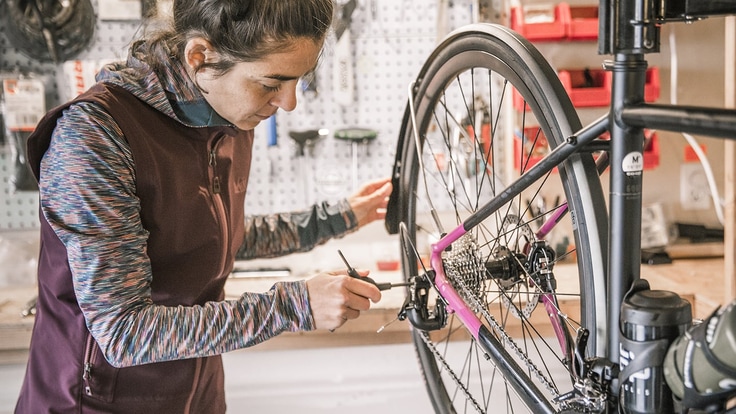Understand Your Tools
Every cyclist should learn how to use basic bike tools correctly. A well-chosen tool collection will help you:
- Keep your bike running well
- Make adjustments to improve its performance
- Repair the bike when it breaks
- Make riding more comfortable
The specific tools you need will depend on the difficulty of the road or trail you're on, how close the route is to civilization, and your own mechanical skills. Most novice cyclists start out with just the basics, then add tools gradually as they gain more experience and start planning more-adventurous rides.
The Bare Essentials
The most common problem faced by cyclists is a flat tire. Flats can happen almost anytime, so learn how to fix a flat tire and carry the following items on every ride:
- Patch kit and/or spare tube (many cyclists carry both)
- Tire levers (at least 2)
- Tire pump
- Cell phone and money (in case something major goes wrong)
Additional Tools
Longer and more challenging rides typically require a larger supply of bike tools. Luckily, most bikes are designed so that a relatively small number of simple tools can be used to make common repairs and adjustments.
No single list of tools works for every ride. Some riders choose to carry all or some of the tools listed below; others carry them only when on long-distance rides or when riding in areas where repair shops and other facilities are not readily available.
REI carries a number of multi-tool kits—some are integrated with saddlebags—that combine all or most of the items listed below. Multi-tools are light, space-saving and a perfect way to stay prepared without spending a lot of money or lugging around bulky tools.
The tools listed here will not handle every mechanical emergency. But they'll be adequate to address the repairs and adjustment procedures that most recreational riders learn to perform over time.
- Phillips and standard screwdriver
- Pliers (preferably needle-nose)
- Allen wrenches (sizes that match the components of the bike being ridden)
- Open-end wrenches (or an adjustable wrench)
- Chain tool
- Spoke wrench
Cleaning/Lubrication Supplies
On longer rides and rides that include lots of dirt roads or trails, you may want to clean and relubricate certain bike components from time to time to maintain good performance. The following items can be easily packed along to meet these needs:
- Chain lubricant
- Small containers of bicycle oil and bicycle grease
- Degreaser
- A few clean rags and some handcleaner
Spare Parts for Touring
Most road, mountain and town cyclists don't need spare parts. However, the touring cyclist should consider the following:
- Spare tire: Tires don't need to be replaced often. But on tours in remote areas, carrying a spare may be easier than finding a suitable replacement. Be sure to buy folding tires, which are far easier to store and carry on tours than nonfolding ones.
- Spare tube: Some blown tubes simply can't be patched. Spare tubes can be real trip-savers.
- Spare brake cable/derailleur cable: These do not break frequently. But when they do, they must be replaced immediately. Cut the cables to length before you leave home to avoid problems out on the road.
- Spare nuts and bolts: Normal cycling can shake even the tightest nuts and bolts loose over time. Experience will be your best guide as to which extras to carry.
- Spare spokes: These may be helpful, as long as you know how to replace them correctly. Spares should be sized at a bike shop, then taped to your frame or a rack until needed.
Only carry these items if you know how to replace them correctly.
